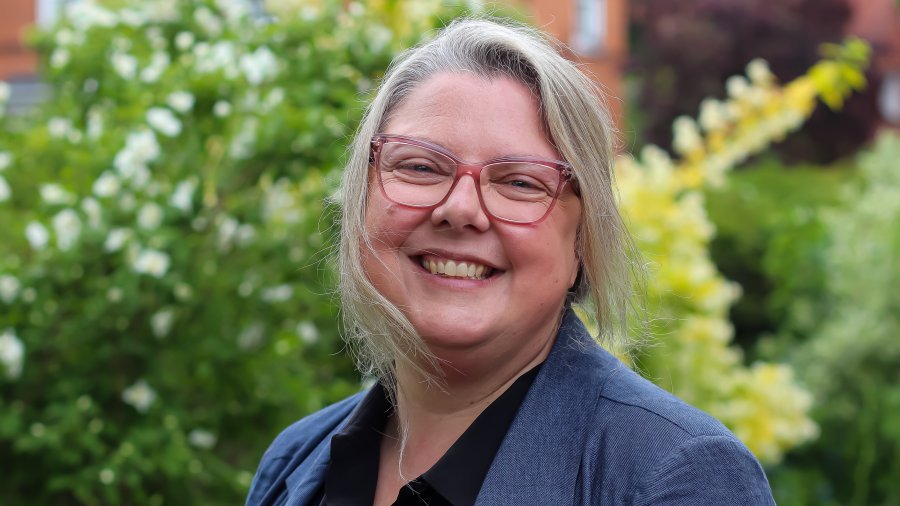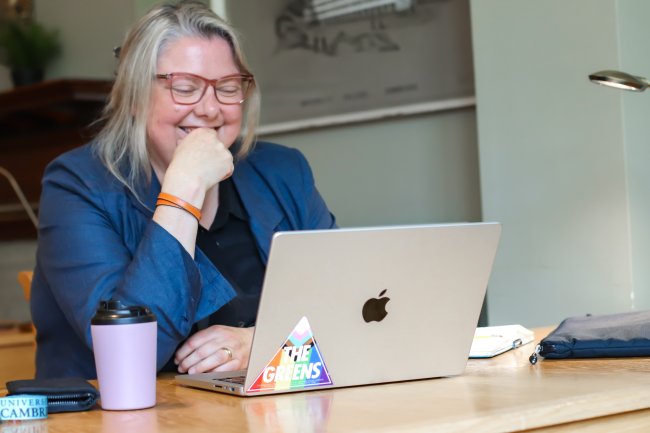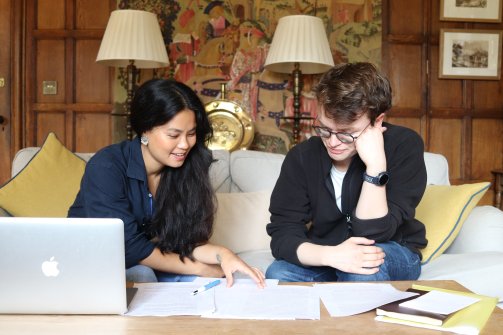The politics of time with Carolyn Smith


‘The Thesis Whisperer’ on neurodiversity in academia, delivering workshops at Wolfson, and a few months of “fruitful hanging out” in Cambridge.

She has 100,000 social media followers, a blog with over 10 million views, numerous best-selling books, and countless passionate fans grateful for helping them succeed in their PhDs or complete research projects – now, Professor Inger Mewburn is at Wolfson as Visiting Fellow and is offering her skills and guidance to students and researchers across the College.
Following the recent publication of her new book – Be Visible Or Vanish: Engage, Influence and Ensure Your Research Has Impact – Inger kicks off her stint at Wolfson with a talk on Tuesday 6 June: ‘How to create research impact in seven (not so easy) steps’, which spotlights PR skills and outlines how to establish “reputational clout” in academia.
She’ll follow up the talk with productivity workshops on Saturday 10 June – ‘Getting sh!t done’ and ‘Building a second brain (for writing) – which will draw on her earlier publications, How to tame your PhD and How to fix your academic writing trouble.
Inger – who is in Cambridge as the first-ever University of Cambridge ThinkLab Visiting Scholar in Residence – is also keen to hear views and chat to students and researchers at Wolfson generally.
“I’m here for some fruitful hanging out,” she says, “and I’m always really happy to have chats with people. If I can help you think through your PhD or your research project, then please reach out. People should see me as a resource while I’m here!”
Currently the Director of Researcher Development at The Australian National University, Inger runs and curates professional development workshops and programs for all ANU researchers.
Since 2006, she has worked exclusively with PhD students and early career academics – helping them finish complex research projects – and is now extending her work beyond PhD and early-career academics to mid-career and professors, because, she says, “everyone’s got problems, right?”
As well as providing the toolkits, skills, and strategies to tackle the practical and emotional challenges of academia, she’s become somewhat of an academic agony aunt to thousands of people across the world. That’s largely thanks to the Thesis Whisperer blog, which she started 13 years ago, dedicated to the topic of doing a PhD and being an academic, as well as a podcast, On the Reg, with her friend, Dr Jason Downs.
“I try to sit with every letter, and sometimes I'll have 20 a day,” she says. And the requests for support often centre on the same handful of problems: “Sometimes it’s about writing dysfunction, issues around structuring things, sometimes it’s about needing to be brave in their writing, writing to their truth, their self. There's often “the arseholes” in their professional lives. And there is – almost all the time – imposter syndrome.
“In academia, there is masses of individual anxiety that’s at odds with the public persona that people present. People sometimes feel they have to present in order to get by or survive. And that creates such cognitive dissonance in people. People often want to do good, to do right by people, but feel like they can’t.”
Beyond the skills and guidance she offers to academics across the globe, Inger also has well-honed strategies to help people reach their potential and leap over their personal and professional hurdles:
“I'm a good listener – and I like to listen. Sometimes people just need to hear themselves say something in order to believe it, or to go, oh, that's how I really feel about that. Often I just provide a safe space for that.
“And I try to be really generous with the people that I'm with. If you give positivity out into the world, generally positivity comes back at you. That’s it really: I just try to be positive, as well as very practical and useful.”
Inger’s seemingly restless quest to create more capable, happier academics, is part of her stated ambition to “create a kinder, more inclusive academy” and to create spaces “where people can do their best work and advance human knowledge for the good of all” – a near perfect match of the Wolfson College mission.
“I think PhD students are some of the best problem solvers, most amazing people that we have,” she says. “We wouldn't have RNA vaccines without PhD students. And yet, a lot of them are so stuck in their PhDs. A lot of them don't finish. A lot of them just have a terrible time. And once they’re done, they face employability problems: they can lose motivation, feel depressed, upset, worried. They can feel hopeless. And they're the smartest people we have.
“So if I can help them, then that's how I can help the world. To me, that's really rewarding. I've worked with many thousands of people, directly or indirectly, and some of them have gone on to do the most amazing things. And I think, well, I had some part in that, not in an egotistical way, but if people like me don't exist, then people like them may not get into that lab and make that RNA vaccine.”
In order to make the biggest impact, Inger frequently looks to technology to help, including using ChatGPT (or ChattieG as her twin sister calls it) as a writing and research assistant.
“I’m always looking at what's next? What's new? Which tool can help? How can I do this faster? But essentially, I just believe in people. I suppose on one of those hopeless romantics who still believe in the power of education.”
Following the publication of Be Visible or Vanish, Inger is now researching neurodiversity and PhD study – a focus that inspired her link up with the ThinkLab, following their collaboration with the BBC.
“I think a lot of academics sit somewhere on various spectrums. And I think it's something we just never talk about."
"I've just started a literature review, and it seems that nobody's done anything around PhD study and neurodiversity, which is extraordinary considering potentially how many people are or have been doing a PhD who identify as autistic, ADHD, and so on.
“It's interesting because, many years ago, neurodivergent people were considered to have poor neuro function, poor cognitive function, and that they'd never be able to do something like a PhD.”
Now, she says, it’s clear that the truth is quite different. And after starting the conversation about neurodivergent academic study on her podcast, she’s has been encouraged by the messages she’s had from listeners and followers, and encourages anyone at Wolfson and across Cambridge to reach out to discuss their own PhD experience as a neurodivergent person.
“Generation Z might actually be the first generation in which people understand their condition, know themselves, and advocate for themselves their whole lives. When the millennials came in, they really changed the conversation around mental health. The next conversation we have to have is about neurodiversity in the PhD, and how the PhD can be quite ableist and present a lot of barriers to people.”
It’s a conversation Inger is having at all levels of academia, where she has seen some striking self-censorship.
“People like Vice-Chancellors, Deans, and Heads of Schools have come up to me and disclosed their neurodivergent conditions, and they say, ‘well, I don't talk about it publicly, but I've been diagnosed and I take pills’ or whatever, or ‘I've worked out how to structure my work day to work around it’.
“It’s fascinating that we've got people at the highest levels – at all levels – who are not talking about it, who are not disclosing it and not saying ‘this is me’, because of the stigma that is still attached to it. And yet they're really, really successful! Their success strategies are interesting to me, and there's probably something everyone can learn from that.
“Some of the most useful academic tactics that I've hit on are actually strategies from the non-neurotypical population: they are actually the most powerful strategies for everyone. So I'm really keen to explore that, to discover how we can make the academic experience a bit easier for neurodivergent people, and in doing so, maybe we make it easier for everybody.”
To achieve this end, Inger brings some of the principles of ‘universal design’ from her architecture background.
“The principle is the same,” she says. “Let’s say you replace stairs with ramps in order to allow access for wheelchairs – well, that also helps people with prams. I'd like to take the same approach to thinking about neurotypical PhD students. It’s not accommodation, it's actual change.
"We need ramps, not stairs. And that means changes to policy, to supervision, practice, everything. It’s actually quite a radical disruption of the PhD model.”
Inger’s architecture background has also given her an appreciation of being at Wolfson College too.
“It looks like my university,” she says. “Wolfson was founded about the same time as the Australian National University. The architecture, particularly in the dining hall and down in the club room, are almost identical. That kind of restrained yet flamboyant modernism, with a little decorative modernism.”
So she’s happy to do some “fruitful hanging out” in College and across Cambridge as she continues her literature review on neurodiversity and PhD study.
In the meantime, you can read more about Inger’s first talk at Wolfson on the website event page, and register on Eventbrite. And you can book onto her Wolfson workshops now.
You can find out more about Professor Inger Mewburn on her website, her Linkedin profile, and her Amazon author page.
For more details on her scholarly work, visit her Google Scholar page or her OrcidID.
You can contact Inger by email here.
And you can find out more about the academic support on offer from Wolfson Library on the website.

Inger has 100,000 social media followers, and her blog and podcast have global reach.







